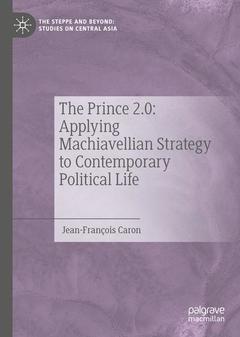Description
The Prince 2.0: Applying Machiavellian Strategy to Contemporary Political Life, 1st ed. 2019
The Steppe and Beyond: Studies on Central Asia Series
Author: Caron Jean-François
Language: English
Subjects for The Prince 2.0: Applying Machiavellian Strategy to...:
Publication date: 11-2019
Support: Print on demand
Support: Print on demand
Description
/li>Contents
/li>Biography
/li>Comment
/li>
This Pivot updates the ideas of the famous political philosopher from the Italian Renaissance, Machiavelli, for the 21st century, using case studies from the West and from Kazakhstan to demonstrate the utility of Machiavelli's ideas for contemporary political life. In truth, Machiavelli's ideas have never lost their value. Although "Machiavellian" as an adjective tends to describe amoral cynicism in contemporary usage, Machiavelli's ideas were deeply ethical and oriented towards achieving long-term goals. Contemporary readers may be put off by medieval language and examples, misled into believing Machiavelli speaks to a different age; and yet the author here explores how Machiavellian strategy can be of value? ethical as well as practical?in the 21st century.
1. On the Objectives of Governments : Preserving the Sovereignty Of the State.- 2. On the Objectives of Governments : Preventing Domestic Conflicts.- 3. On Human Nature and How to Control it.- 4. The Virtues of Political Required Leaders in Democratic Societies.- 5. The Necessity to Entrust Power to One Individual : To Save a Democracy and its Principles.- 6. The Necessity to Entrust Power to One Individual : to Create a New State.- 7. The Required Qualities of a Prince.- 8. How Princes Ought to Be Perceived.- 9. Why Princes are Becoming More Popular Today.
Jean-François Caron is an Associate Professor and Chair of the Department of Political Science and International Relations at Nazarbayev University where he teaches Political Theory.
Updates Machiavelli's ideals for the contemporary world Utilizes case studies of politicians in the West and in the post-Soviet world to show contemporary relevance of Machiavelli Explores how Machiavellian strategy can be of value in the 21st century
© 2024 LAVOISIER S.A.S.
These books may interest you

Botero: The Reason of State 31.58 €



